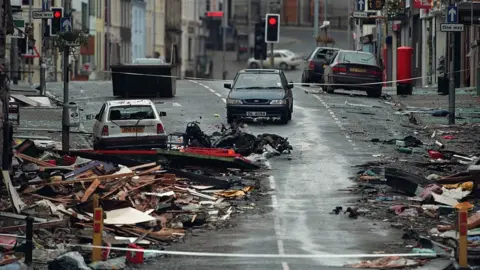Omagh bomb: Public inquiry will examine four key areas
 Pacemaker
PacemakerThe inquiry into the Omagh bomb will examine four key issues surrounding whether the attack could have been prevented.
The terms of reference for the inquiry were published on Wednesday.
Twenty-nine people including a woman pregnant with twins died after the attack in the County Tyrone town on 15 August 1998.
It was the biggest single atrocity of the Troubles.
Families of victims campaigned for an inquiry for more than a decade.
In February of 2023, the government announced an independent statutory inquiry would take place.
It has now said the terms of refence of the inquiry - agreed by the Northern Ireland secretary and inquiry chairman Lord Turnbull - would investigate issues linked to four grounds identified by the High Court in 2021.
These include:
- The handling and sharing of intelligence
- The use of mobile phone analysis
- Whether there was advance knowledge or reasonable means of knowledge of the bomb
- Whether disruption operations could or should have been mounted, which may have helped prevent the Real IRA attack
Michael Gallagher, whose son Aiden died in the bombing, took the legal challenge that resulted in the judge directing the state to act.
The chairman of the inquiry, Lord Turnbull said his role is to "establish the truth of whether the terrible events of 15 August 1998 could have been prevented".
Lord Turnbull emphasised that the inquiry would act as "an entirely independent body" and would conduct a "thorough and robust" investigation.
Northern Ireland Secretary Chris Heaton-Harris said now that the terms of reference had been agreed it would allow the inquiry to press ahead with its work.
He called on the Irish government to explain what consideration it had given to setting up its own inquiry into the attack.
'One inquiry optimal'
Tánaiste (Irish deputy prime minister) Micheal Martin said the Irish government would be "fully co-operative" with the inquiry.
"We've been seeking the terms of reference for quite some time so we could then respond," he said.
But Mr Martin said one public inquiry was "optimal", despite calls from some campaigners and politicians for the Republic of Ireland to set up its own parallel inquiry.
"I think two separate inquiries doesn't make sense because it would be clear overlap and duplication and crossing each other, but we have mechanisms and we've changed the law a number of occasions to facilitate the information the Republic may have in respect of certain crimes."
The minister also insisted his government was doing enough to tackle legacy issues.
John Fox, a solicitor who represents victms' families described the announcement of the terms of the inquiry as "highly significant".
"It cannot be understated on behalf of the families. This is a significant moment, they have campaigned on this for 25 plus years."
Mr Fox said he was "encouraged" by a promise of full co-operation from the Irish government but would wait to "see if they put that into action".
The Omagh bombing came four months after the signing of the Good Friday Agreement, the peace deal that eventually brought an end to decades of violence known as the Troubles.
It was carried out by dissident republican group the Real IRA, which split from the much larger Provisional IRA after objecting to its ceasefire of 1997.
No-one has ever been convicted of the atrocity.
Real IRA leader Michael McKevitt, who died in 2021, was found responsible for the bombing in a civil case in 2009, with three other men - Liam Campbell, Colm Murphy and Seamus Daly - also being found liable for the attack.
The four men were named by Mr Justice Morgan in a ruling made as part of a landmark case taken by some of the families of the victims.
The 12 relatives were awarded more than £1.6m in damages for the attack but to date nothing has been paid.
